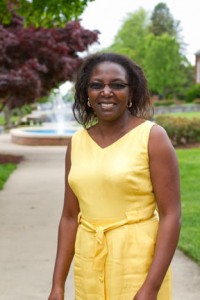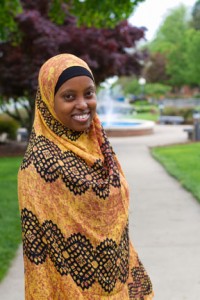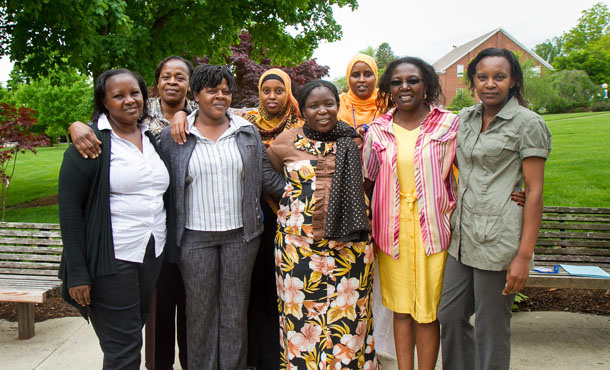Among the 200 people studying at the 2014 Summer Peacebuilding Institute (SPI) are eight Kenyan women in the Women’s Peacebuilding Leadership Program (WPLP). Ranging in age from 23 to 51, the women come from across Kenya and work for a variety of NGOs or in academia.
Now in its third year, the WPLP admits students in cohorts from specific areas of the world to develop peacebuilding and leadership skills over an 18-month period, culminating in a graduate certificate from Eastern Mennonite University’s Center for Justice and Peacebuilding. EMU works with partner organizations to identify candidates, and matches students with mentors. Previous cohorts have come from Somaliland, Liberia and the South Pacific.
Below are short profiles of two of the Kenyan women now on campus at SPI.
A mind in motion at SPI

On a typically warm, green, sunny and peaceful late afternoon at SPI, Eunice Githae’s mind is not entirely at rest. After a presentation on domestic violence earlier in the day by professor Carolyn Stauffer, her mind is wandering back home to Kenya, where internalized traumas are giving rise to widespread social troubles.
Githae sees the individual casualties in her work as a counseling psychologist and in the subject matter of her ongoing doctoral research into the role of family in alcoholism treatment and recovery.
“We are a society that has not come to terms with what happens within ourselves,” says Githae, also a lecturer in counseling psychology at Kenya Methodist University’s Nairobi campus.
She needs more time to process what she’s been learning about trauma, to confront the helplessness she sometimes feels when she considers the vast challenges facing her country. These are just the inevitable bumps along the way, though; don’t mistake this for defeat.
“I’m really taking it as a step back so I can leap farther,” she says, of her time at SPI.
The term “peacebuilding” itself was an unfamiliar one to Githae when she first saw an advertisement for the WPLP. As she read more about it, though, she realized that she was already putting many of the everyday skills and theoretical understandings of peacebuilding into practice through her work as a counselor and a psychologist.
She applied, and now she’s here imagining all sorts of new possibilities. While counseling focuses on individual healing, peacebuilding expands that focus to the individual’s community. Therapy for an individual who lives in a broken community, Githae is realizing, is like treating someone for cholera without cleaning up the water they drink.
Many, many people are going to need to be on board with these ideas to enact any appreciable change, she says. There is work to be done, and as the sunlight grows softer, Githae’s mind continues to spin.
A young Kenyan leader looks beyond politics

Though it sits just outside Wajir, a major town in Kenya’s North Eastern Province, the small village of Leheley has yet to join the electrical grid. The people who live there are poor and therefore marginalized. Running power lines there simply isn’t a priority to those in charge.
“My people support the leaders 100 percent, but their support is not reciprocated with any kind of development in the village,” says Shamsa Omar, who grew up in Leheley and is attending SPI through the WPLP.
Education was Omar’s springboard out of Leheley and on to bigger ambitions. After earning top-notch grades at Wajir Girls Secondary School, she won a scholarship from a Kenyan bank to study at Moi University. And while still finishing up a BA in sociology, Omar launched a campaign to represent the Lagboghol South ward on the Wajir County Council, determined to let Leheley be ignored no longer.
She ran an enthusiastic campaign and says she’d drummed up widespread support until, just days before the March 2013 election, things came to a screeching halt. The elders in the community decided that Omar shouldn’t run, and that was that. What the elders say goes, even when you’re a young, status quo-bucking political candidate like Omar.
“I was very discouraged because I had the support of the people,” says Omar, now 23 years old.
Omar returned to university to finish her degree and, since September, 2013, has been working for the Center for Victims of Torture, an American NGO based in St. Paul, Minnesota. She now works as a psychosocial counselor in northeastern Kenya’s Dadaab, the world’s largest refugee camp, home to hundreds of thousands who have fled conflicts in countries all over East Africa. In the camp, Omar leads individual and group therapy for victims of torture and gender-based violence – intense and sometimes distressing work that has caused nightmares.
It has also exposed her to an inspiring resilience that she sees in some of her clients. Before she began working as a counselor, Omar wasn’t convinced that sitting around and talking would do any good solving people’s problems. Now, she’s a believer.
She’s applying a resilience of her own to her goals for her home. After her run for office was cut disappointingly short, Omar realized that there are “many other ways” to lead. Accordingly, she founded the Wajir Young Women’s Association, through which she hopes to work with like-minded young women to improve the lives of women throughout the region. She also serves as a mentor to current recipients of the same scholarship that allowed her to get her undergraduate degree.
Omar says her experience so far in the WPLP has opened her mind, inspired and energized her –through the things she’s learned and her peers in the program.
“I cannot walk alone on this journey. I need so many people to help me out,” she says. “I have so many things in my mind. I have big dreams for my community.”
